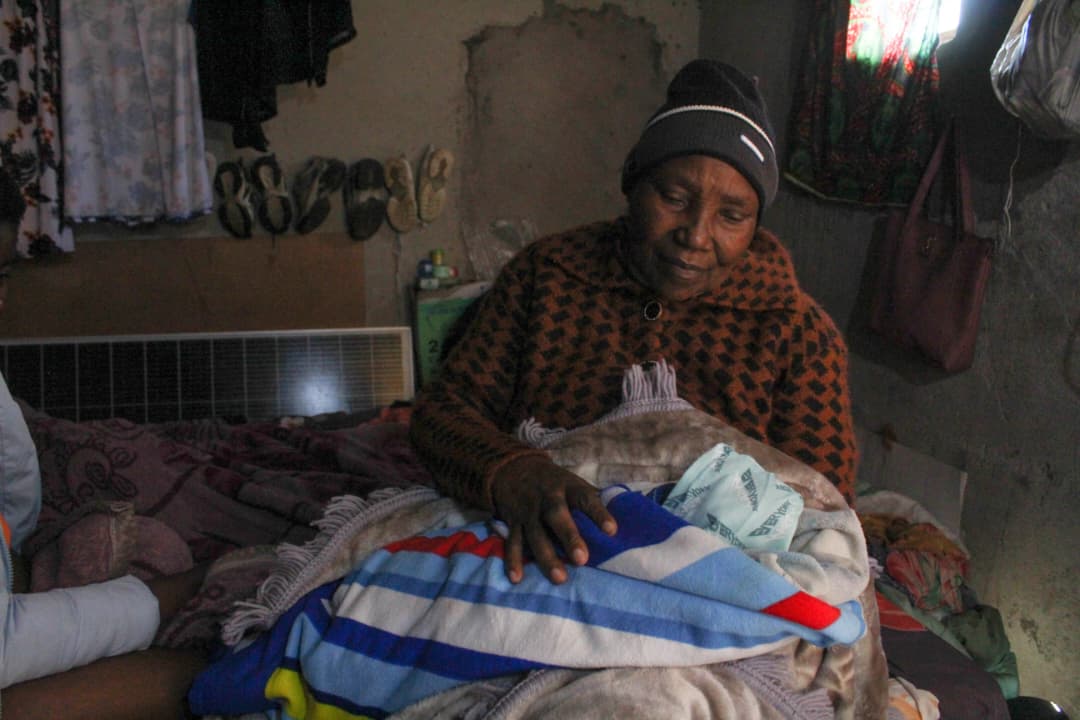Current Affairs
Delivering Miracles at Dawn: Inside Epworth’s Home Birth Stories

By Kudakwashe Emma-Louise Zihonye
Melody heard a knock on her door around 4 am in the early hours of Mothers’ Day. The cold mornings of the month of May makes it hard to wake up, but for her it was not much of a surprise as she is used to these unannounced emergencies. On the door was Christa’s husband who came in to seek help as Christa had been in labour the whole night. She grabbed a pair of gloves and followed the young man.
69-year-old Melody rushed to the homestead with her crutch supporting her fragile body on the rocky landscape. Christa gave birth to a baby boy in a dark room with no light around 6:05 am on the 11th of May 2025.
To Melody, this is not a rare occurrence as she has been doing this in the dormitory suburb of Epworth for more than 20 years.
“This has been my life since 2003 as a Traditional Birth Attendant here in Epworth. I offer delivery services for those in need, but receive no money or compensation for this work. However, for me and the rest of the 25 women I work with, we realise that people are in need of such services,” said Melody Nyakudanga.

A young mother carries her baby on her back after visiting Gogo Nyakudanga in Epworth. More
than just a traditional midwife, Gogo serves as a trusted counsellor in the community. Photocredit- Kudakwashe Emma-Louise Zihonye
The Traditional Midwives group which is registered with the Traditional Medicines Council of Zimbabwe, has managed to deliver 710 babies since 2021 according to their records.
“We have helped deliver over 710 babies in Epworth only over the past 4 years not because we want to, but because most of these girls cannot afford to give birth at our local clinic. They do not have resources, and we cannot let them do it on their own,” she said.
Epworth, is densely populated suburb 12 kilometers southeast of Harare, with a few clinics. The nearest one is Dombo Clinic which now serves as vital healthcare lifeline, providing basic medical care to thousands of residents who have limited access to health facilities.

Gogo Nyakudanga
The community faces persistent challenges like poor sanitation, with many households lacking access to proper waste management systems, and limited and unreliable water supply. Overcrowding, a legacy of years of unplanned settlement, puts immense pressure on the available infrastructure and services. Some parts of Epworth do not have electricity.
Some young women in Epworth now prefer giving birth at home with traditional birth attendants rather than going to the local clinics because of the risks and expectations at these clinics.

An expecting young mother holds her baby close to one of the Mbuya Nyamukuta’s homes. Her pregnancy was not registered at a local clinic because she could not afford the $40 required, and she is likely to give birth at home. Photo Cred – Kudakwashe Emma-Louise Zihonye
Nyarai, (not her real name) said that it is not safe to deliver at local clinics as negligence and corruption is now the norm.
“Without money and required medical supplies, the nurses at Dombo Clinic will not even look at you. They will even let you give birth at the gate if you are not registered, or if you do not have money. It is really dangerous for expecting mothers. Traditional midwives welcome us with open arms. Even if we have not had something to eat from our homes, they will prepare food for us regardless of their own circumstances”, she added.
Dombo Clinic in Epworth charges nearly $40 USD to register pregnancy and requires one to purchase some of the utensils used during birth. Additionally, on the delivery date, an expecting mother has to bring an additional $40 USD for emergency ambulance services to a bigger hospital in case of complications arising. The cost of services prevents many women from seeking necessary clinical midwifery support, leaving them vulnerable during pregnancy and childbirth.

Gogo Nyakudanga holds a newborn baby she had just delivered early morning on 11 May 2025. Photocredit – Kudakwashe Emma-Louise Zihonye
Maternal health should be a right accessible to all, yet many women find themselves unable to afford the rising costs associated with childbirth in public hospitals. In their search for care, many turn to traditional midwives, who, despite limited resources, provide critical support and care to under-served communities.
Zimbabwe has one of the highest maternal mortality rates in the world. According to the latest Zimbabwe Demographic and Health Survey 2024, 212 mothers die for every 100,000 live births, and 14% of all births are home deliveries.
Neonatal deaths has increased from 29 per 1000 to 37 per 1000 live births, meaning many babies die within the first 28 days of life.

Epworth clinic. Photocredit- Kudakwashe Emma-Louise Zihonye
“We are trained and certified by the Traditional Medicines Council of Zimbabwe. However, it has been long since we had training, and we wish that we could get free courses where we could upgrade our knowledge for the betterment of the Epworth community,” said Melody.
According to the World Health Organisation, millions of women globally still give birth without a skilled health worker by their side, and one-third do not receive even four of WHO’s recommended eight pregnancy checks.
Anna Sande, former Mayor of Epworth, said most of the local clinics are out of reach for many in terms of the charges, considering the harsh economic realities in our country.

Gogo Nyakudanga stands at her door, where she usually receives knocks for birth emergencies. Photocredit- Kudakwashe Emma-Louise Zihonye
“Affordability is a real issue. Traditional Midwives are, basically, an alternative. Hospitals turn away women for not having the materials needed for a delivery, and may even require you to purchase your own utensils such as cotton, blades and other things. What I think, is that the local authority should prioritise care for mothers before finance because access to health care is a human right, and it should not be compromised.”
Basic needs for mothers should be readily available in clinics so that women are not be turned away. Epworth deserves to be a society with healthy mothers and healthy babies,” Sande added.
Zimbabwe’s healthcare system faces chronic challenges, including an exodus of health workers to other countries in search of better working conditions, competitive salaries, and improved career prospects. This brain drain has left public hospitals and clinics severely understaffed, leading to longer waiting times, poor patient-to-doctor ratios, and overstretched facilities. Essential services such as maternal care, emergency response, and specialised treatments are compromised, further weakening the system’s ability to provide quality healthcare.
Itai Rusike, the Executive Director at Community Working Group on Health (CWGH), said that poor quality care remains a key issue for maternal and child health services in the public health institutions during the absence of nurses and doctors as a result of the ill capacitation crisis and the prolonged impasse.
“There is need to increase focus on quality of care in the provision of maternal and child health services. Home deliveries are a key factor in the county’s high maternal mortality.”
” Traditional Birth Attendants are now the norm in many urban poor communities due to the non-functionality of the public health institutions as a result of the incapacitation. However, TBAs are not properly skilled to deal with complications that may arise during a delivery and they are also not equipped to provide post-natal care services to the newborns,” he emphasised.
The United Nations Population Fund emphasises that maternal health services are part of reproductive rights. Access to services (antenatal, delivery, postnatal), information, family planning, are all part of what “sexual and reproductive health” means.
ALSO READ : Auditor General Flags Misuse of Funds at Epworth Local Board
Source – TheZimbabweTimes
Current Affairs
Minister Rwodzi Charts Path as Sector Takes Lead in GDP Growth

Itai Mazire
Tourism and Hospitality Industry Minister Barbara Rwodzi has implored players in the sector to embrace innovation, sustainability, and stronger partnerships to safeguard Zimbabwe’s tourism gains, as the industry now leads national GDP growth ahead of mining and agriculture.
In a speech delivered on her behalf by Tourism Permanent Secretary Dr. Takaruza Munyanyiwa at the Hospitality Association of Zimbabwe (HAZ) Summit and Annual General Meeting in Harare today, Minister Rwodzi said the country stood at a “historic crossroads” following its recent listing by Forbes as the best destination to visit in 2025.
“This is a well-deserved accolade which we should celebrate and sustain going forward. Congratulations, makorokoto, amhlope to the service providers of the tourism and hospitality industry of Zimbabwe.”
The Minister applauded the sector’s resilience in the face of pandemics, economic headwinds, and climate-related shocks, noting that the spirit of Zimbabwean hospitality remains unbroken.
“We have continued to smile, to serve, and to tell our authentic story, hence reaping the rewards now,” she said.
Giving an update on performance, Minister Rwodzi reported that international tourist arrivals grew by 9 percent between January and September 2025 compared to the same period last year, with strong traffic from the Americas, Africa, and Asia.
Domestic travel also surged by 20.9 percent over the same period, while the sector generated approximately USD 922 million in 2025 a 10 percent rise from the USD 839 million recorded last year.
“These are encouraging signs that our recovery is gaining positive traction. But future-proofing requires more than recovery it demands transformation,” she said.
Minister Rwodzi outlined five pillars she said would anchor the transformation of the sector: digitalisation; sustainable and climate-resilient tourism; human capital development; infrastructure and connectivity; and stronger branding and market diversification.
“The future of hospitality is digital,” she said. “We must move from brochures to big data, from paper-based booking to smart platforms.”
She urged operators to embrace online booking systems, virtual reality tourism aids, and other digital tools that enhance visitor experiences.
On sustainability, Minister Rwodzi said protecting Zimbabwe’s natural and cultural heritage was “not an expense it is an investment in the longevity of our industry.”
The Minister stressed the need to invest in human capital, calling on operators to work closely with academia to bridge skills gaps and develop tomorrow’s hospitality innovators. She highlighted the First Lady, Dr. Auxillia Mnangagwa’s gastronomy vision as a key avenue for elevating Zimbabwe’s culinary offerings.
On infrastructural development across the country, she said it remained central to competitiveness: “A tourist’s journey begins long before they reach our front desk — it begins on a road, a runway, or a mobile network.”
Minister Rwodzi reiterated that Government is committed to creating an enabling environment, pointing to the recent reduction of tourism fees by up to 50 percent to lower operating costs.
“Future-proofing cannot be achieved by Government alone,” she said. “The private sector is the engine of creativity, investment, and service excellence.”
Her call for collaboration was anchored on an African proverb which states that, “Tomorrow belongs to the people who prepare for it today.”
The Minister said the role of HAZ remained critical as Zimbabwe eyes increased international tourist inflows.
“The world’s eyes are turning towards Zimbabwe. We have the assets, we have the people, we have the passion so why not?” she said.
“To HAZ, your role has never been more critical. You are the unified voice of the hospitality industry. Your strength lies in your collective action.”
She said the ongoing summit provided a platform to “strategise, innovate, and build consensus” as the sector pushes towards Vision 2030.
“The potential is vast. The time is now. Let us build not just an industry, but a legacy,” said Minister Rwodzi.
Current Affairs
Apostolic Church Founder Paul Mwazha Dies at 107

Zimbabwe and the wider African Christian community are mourning the loss of Bishop Paul Mwazha, the revered founder of the Apostolic Church in Africa, who passed away today at the remarkable age of 107.
Bishop Mwazha, widely regarded as one of the continent’s most influential religious leaders, dedicated his life to the growth and spiritual guidance of his church, which boasts millions of followers across Zimbabwe and beyond. His teachings, rooted in faith, discipline, and community service, have left an enduring legacy that continues to shape generations.
The Apostolic Church in Africa under his leadership became a cornerstone of spiritual life in many communities, providing not only religious guidance but also social support and education initiatives. Church leaders have called for prayers as they prepare for national and regional mourning rituals.
Further details on funeral arrangements and memorial services are expected to be released in the coming days.
Business
Zimbabwe Bets Big on Biotech to Fuel Industrial Revolution


Dr. Eng. Willie Ganda
By Enia Dube
The Minister of Higher and Tertiary Education, Innovation, Science and Technology Development, Hon. Dr Fredrick Shava, has thrown his weight behind biotechnology as a key driver of the country’s industrialisation and modernisation agenda.
Speaking at the National Biotechnology Authority (NBA) Strategic Planning Workshop in Kadoma, Dr Shava urged the Authority to identify biotechnology-led opportunities that can boost national production and accelerate economic growth.
“Biotechnology serves as a key catalyst for NDS2 implementation, advancing inclusive economic growth, job creation, and sustainable industrial development,” Dr Shava said, emphasising the need to integrate biotechnology into national value chains to unlock a biotechnology-driven economy. He added that this would turn innovation into industry, knowledge into enterprise, and science into jobs.
The NBA has made notable progress in establishing a strong regulatory framework, promoting biotechnology research and commercialisation, and raising public awareness about the sector’s potential. The Authority has successfully commercialised products such as Mapfura wine and Cofsol cough syrup, and has several other biotechnology products in the pipeline.
Incoming NBA Board Chairperson, Professor Idah Sithole-Niang, echoed Dr Shava’s sentiments, emphasising that the Authority’s five-year strategic plan must meaningfully contribute to the attainment of Vision 2030. “This event marks a significant milestone in the Authority’s ongoing efforts to enhance the role of biotechnology in Zimbabwe’s socio-economic development,” she said.
The workshop aimed to realign priorities and resources in response to emerging technologies and global biotechnology trends, and develop a strategic roadmap to strengthen biotechnology as a key driver of Zimbabwe’s socio-economic transformation. The rapidly evolving global biotechnology landscape, including advancements in gene editing, bio-manufacturing, and climate-smart innovations, presents both new opportunities and challenges for Zimbabwe.
“We recognise the pressing need for an inclusive and forward-looking strategic plan that can navigate the complexities of the biotechnology landscape,” Professor Sithole-Niang noted. The workshop was attended by researchers, government officials, and NBA staff, who are optimistic about the potential of biotechnology to drive Zimbabwe’s economic transformation and achieve Vision 2030.
-

 Current Affairs1 week ago
Current Affairs1 week agoOperation restore order
-

 Crime and Courts2 months ago
Crime and Courts2 months agoMasasi High School Abuse Scandal Sparks Public Outcry
-

 Crime and Courts2 months ago
Crime and Courts2 months agoKuwadzana Man Jailed for Reckless Driving and Driving Without a Licence
-

 Current Affairs3 months ago
Current Affairs3 months agoMunhumutapa Day: Zimbabwe’s Newest Public Holiday Set for Annual Observance
-

 Current Affairs4 months ago
Current Affairs4 months agoBreaking: ZIMSEC June 2025 Exam Results Now Available Online
-

 Current Affairs1 month ago
Current Affairs1 month agoBREAKING NEWS: ZANU PF Director General Ezekiel Zabanyana Fired
-

 Current Affairs3 months ago
Current Affairs3 months agoGovernment Bans Tinted Car Windows in Nationwide Crime Crackdown
-

 Current Affairs2 months ago
Current Affairs2 months agoExposed: Harare GynecologistChirume Accused of Negligence, Extortion, and Abuse



